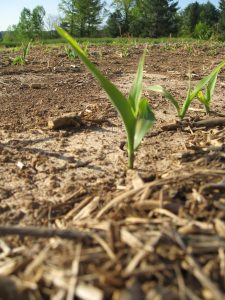By Joy Beam, Technical sales support
Following the slug-infested spring of 2017, many growers are worried we will have the same problem in 2018, and for good reason. We haven’t had a cold enough winter in several years to kill the adult slugs from the previous year, and the effectiveness of slug controls, such as Deadline or spraying salt concentrated solutions, is controversial. When slugs attack, we are left with few weapons besides just praying for sunshine and new leaf growth.
So first, what do we know conclusively about slugs? Thanks to Dr. Tooker, Penn State entomologist, we know that the grey garden slug and the marsh slug are the most common slugs that farmers in the northeast face. We also know that slugs feed by “scraping”, which is what leaves the jagged-edged scars on corn leaves. Slugs are also not classified as insects but are in the mollusk phylum. These pests can self-fertilize and can lay up to 500 eggs per slug! That means that if a young corn plant hosts 10 slugs (which I know quite a few of us saw last year), that corn plant becomes a factory for 5,000 eggs! Do the math, it adds up quickly. In fact, finding just one slug per square foot shingle trap means that 75% of plants in that field are already damaged.
Thankfully, we also know that ground beetles in both the larvae and adult stage are the slug’s largest predator, which means encouraging population growth may be our most effective weapon against slugs. However, this poses a problem in itself. Neonicotinoids, a class of insecticides in many seed treatments, are harmless to slugs since they are not true insects. However, they accumulate in the slug’s body, creating what some call “toxic slugs”. Once the ground beetle eats the slug, he ingests the neonicotinoid and becomes lethargic or dies, leaving the rest of the slug population free to thrive.
As a result, some farmers are choosing to plant corn seed not treated with neonicotinoids. We are looking into doing this at my home farm. Whether the good outweighs the bad with this strategy, we will find out, but with so few options to wage war against slugs, it is an option worth looking into for us. If your customers are looking to do the same, remember that our entire KingFisher line is free of neonicotinoids.
Speak to an expert at King’s AgriSeeds now at 1-717-687-6224 or email us at [email protected].
